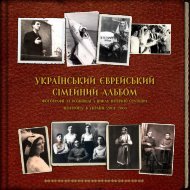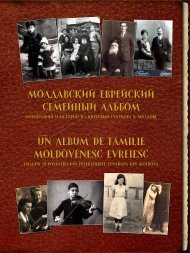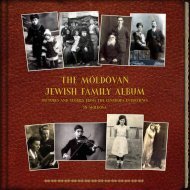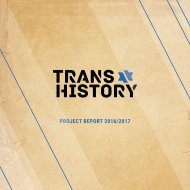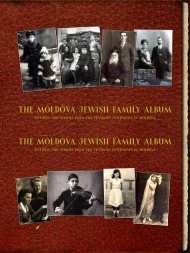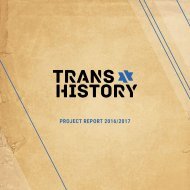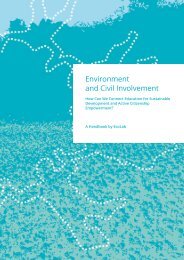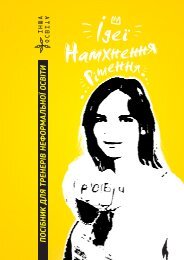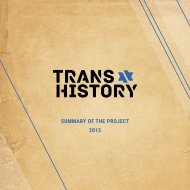The Ukrainian Jewish Family Album
www.centropa.org preserving Jewish memory bringing history to life
www.centropa.org
preserving Jewish memory
bringing history to life
You also want an ePaper? Increase the reach of your titles
YUMPU automatically turns print PDFs into web optimized ePapers that Google loves.
Portraits<br />
Grigoriy Stel’makh<br />
Photo taken in: Kyiv, 1947<br />
Interviewer: Zhanna Litinskaya<br />
My father Isaac Stel’makh in his office in the<br />
military administration in Berlin. This photo was<br />
taken to send it to the family in Kyiv. My father<br />
was the product of his epoch. He went to cheder<br />
like all <strong>Jewish</strong> boys and then finished a <strong>Jewish</strong><br />
school. <strong>The</strong>n… I would say he was drawn in with<br />
the ‘wheel of history.’ He left his home at the<br />
age of 14. He headed to Kamyanets-Podilskyi,<br />
100 km west of his home where he joined the<br />
Komsomol and became a Komsomol activist.<br />
Photo taken in: Berlin, 1956<br />
My father, Isaak Stel’makh, in jail. In 1945<br />
he reached Berlin. After the victory, my<br />
father was assigned to the Soviet Military<br />
Administration of the city. On 20 January<br />
1949, state security officers came to his<br />
office and asked him to follow them. He was<br />
arrested under article 58, item 10: anti-Soviet<br />
agitation and propaganda. He was taken to a<br />
prison in Berlin. For ten months he underwent<br />
interrogation, including torture, before he<br />
was sentenced to 10 years in prison.<br />
Photo taken in: Kyiv, 1962<br />
I took this photograph of my father<br />
Isaac Stel’makh during the Celebration<br />
of Victory Day in Kyiv. <strong>The</strong>re was a big<br />
official celebration of Victory Day in<br />
1962. It was always the best holiday<br />
for my father. On 14 August 1956, the<br />
Military Collegium of the Supreme Court<br />
of the USSR reviewed my father’s case<br />
and closed it for absence of corpus<br />
delicti. After spending several years in<br />
prison, my father was rehabilitated.<br />
Photo taken in: Kyiv,1936<br />
Interviewer: Tatyana Chayka<br />
My husband, Kushel Finberg,<br />
when he was 19, at the factory<br />
in Kyiv where he worked. Before<br />
we married in 1947 my mentality<br />
was Soviet with simply no place<br />
for <strong>Jewish</strong> traditions or faith. <strong>The</strong><br />
war and the Holocaust radically<br />
changed my mind. With my<br />
marriage to Kushel, my life began<br />
to fill with <strong>Jewish</strong> traditions and<br />
religion again.<br />
Lilya Finberg<br />
Photo taken in: Chernivtsi, 1920s<br />
Interviewer: Andreea Laptes<br />
My husband, Carol Ionel Greif, as<br />
a baby with his mother Amalia.<br />
Carol was a Jew from Chernivtsi.<br />
He studied at two universities. He<br />
studied languages and chemistry by<br />
correspondence at a university in<br />
Belgium. I met him in Brasov before I<br />
left for university. He was older than<br />
me and had quite a reputation with<br />
women, but to me he was friendly<br />
and he often took me out to the<br />
theater, behaved like a gentleman,<br />
and joked that when I grew up he<br />
would marry me.<br />
Ruth Greif<br />
12


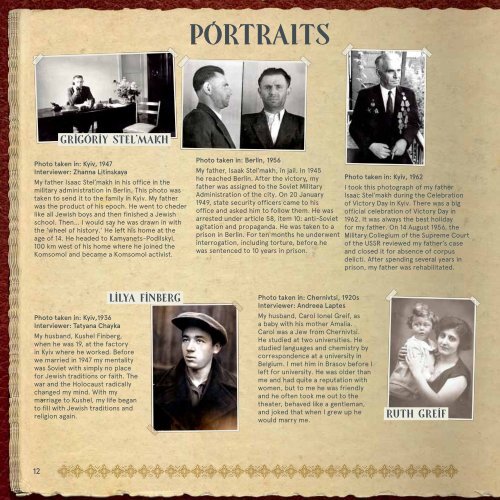

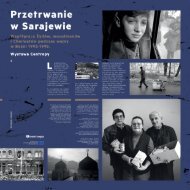
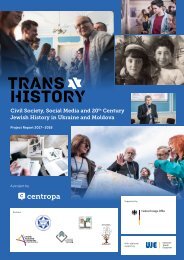
![Trans.History - The Moldovan Jewish Family Album - Exhibition Booklet [EN] - revised version](https://img.yumpu.com/59829280/1/190x190/transhistory-the-moldovan-jewish-family-album-exhibition-booklet-en-revised-version.jpg?quality=85)
